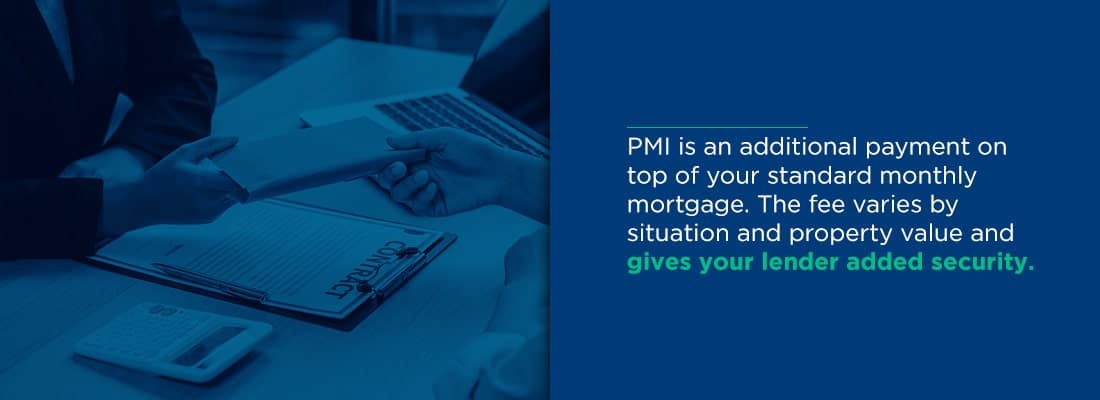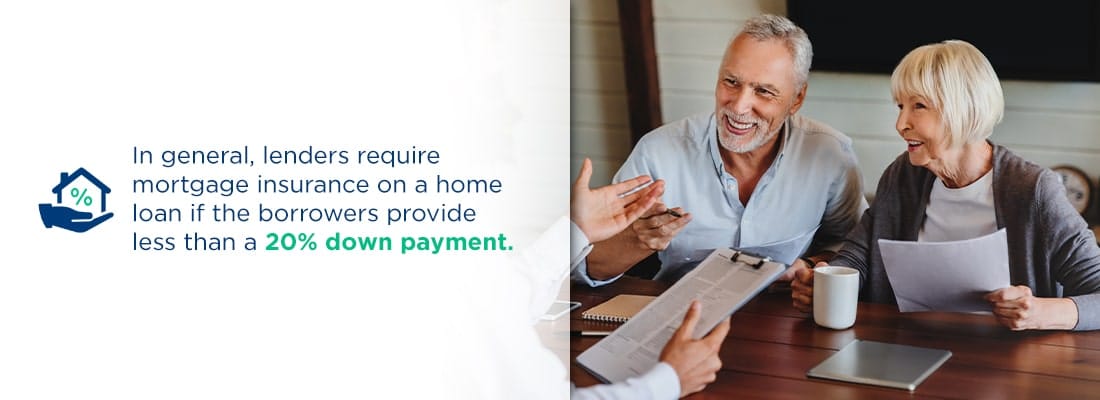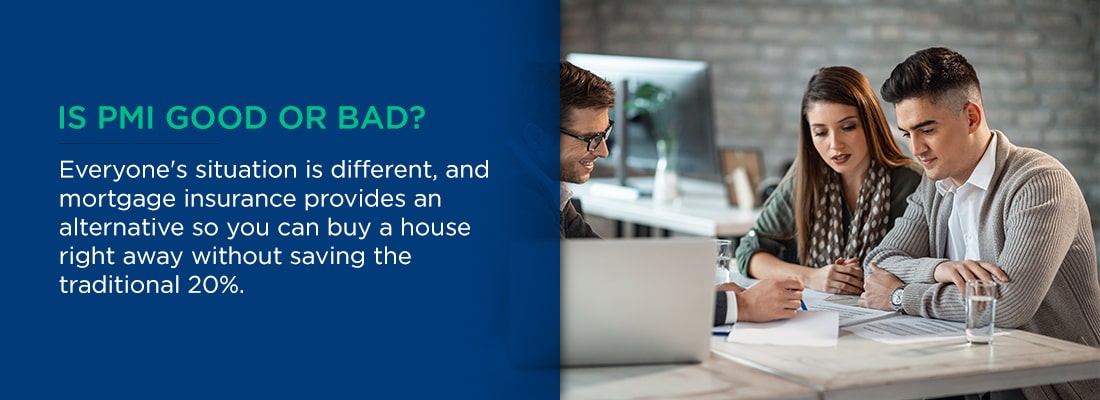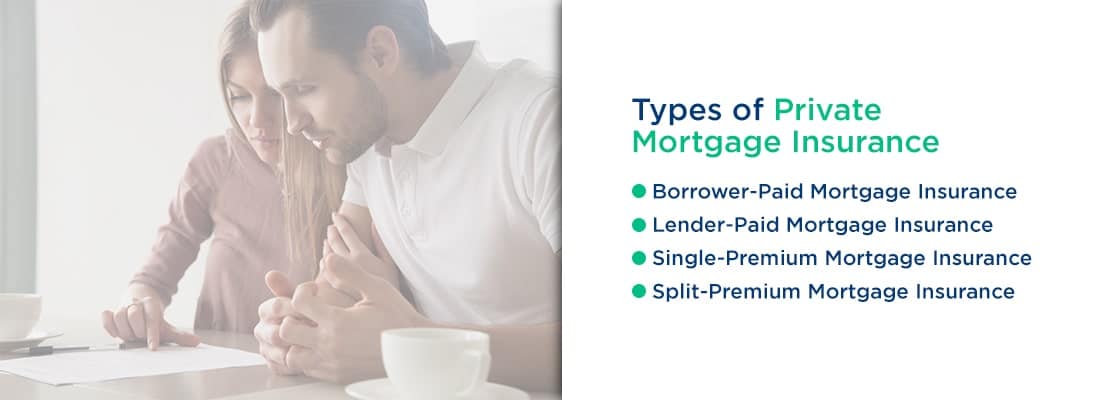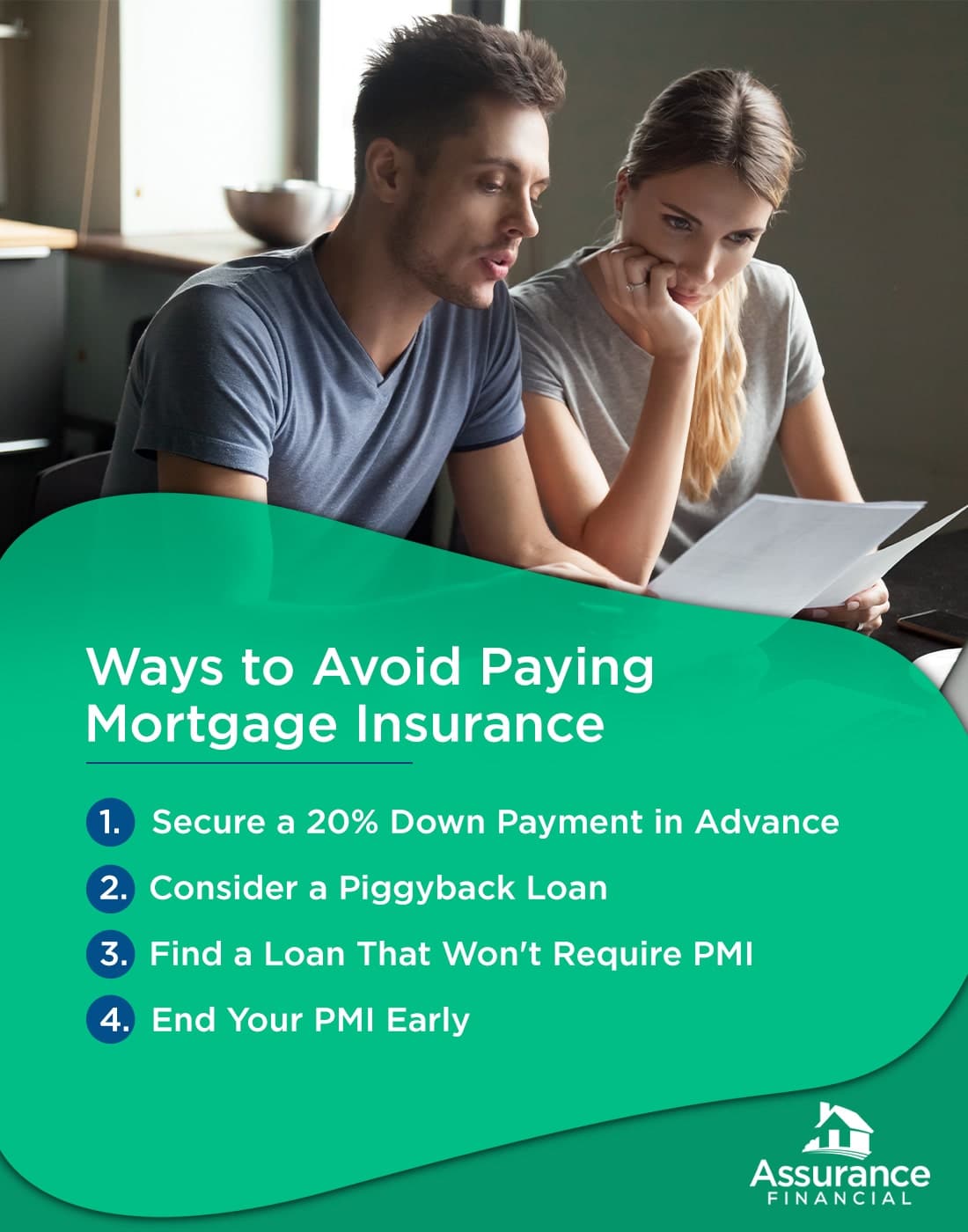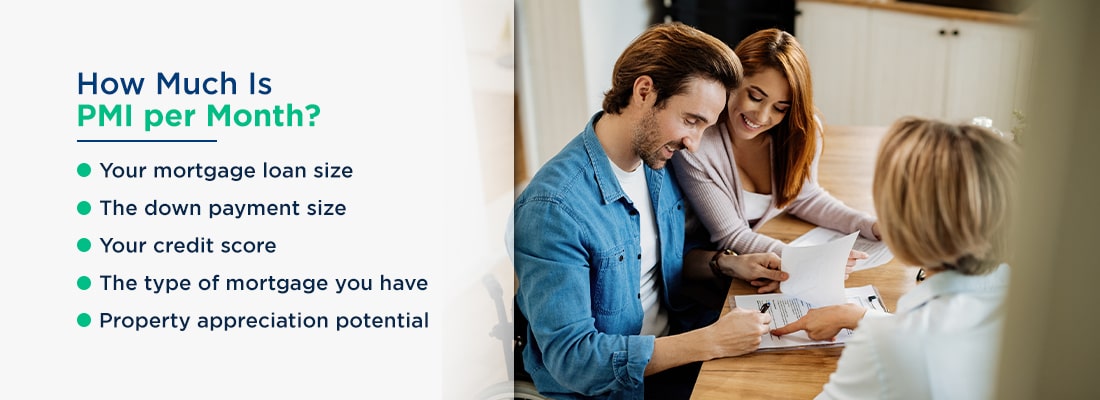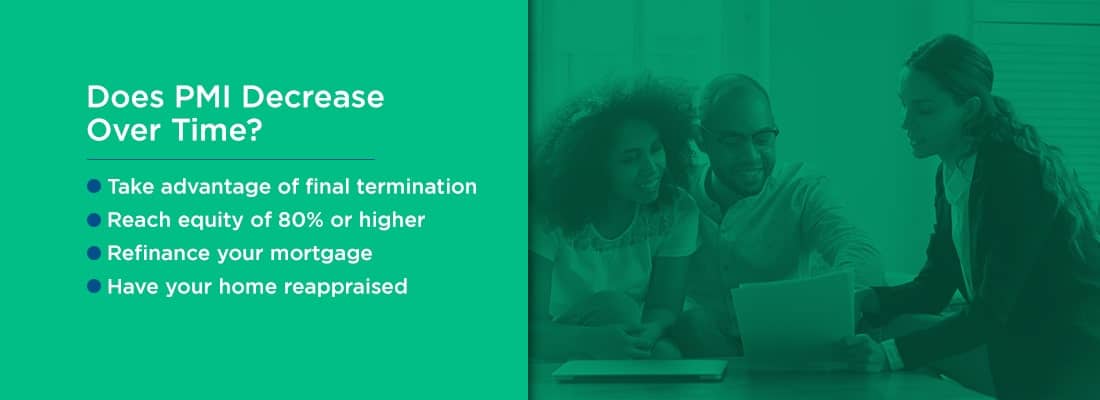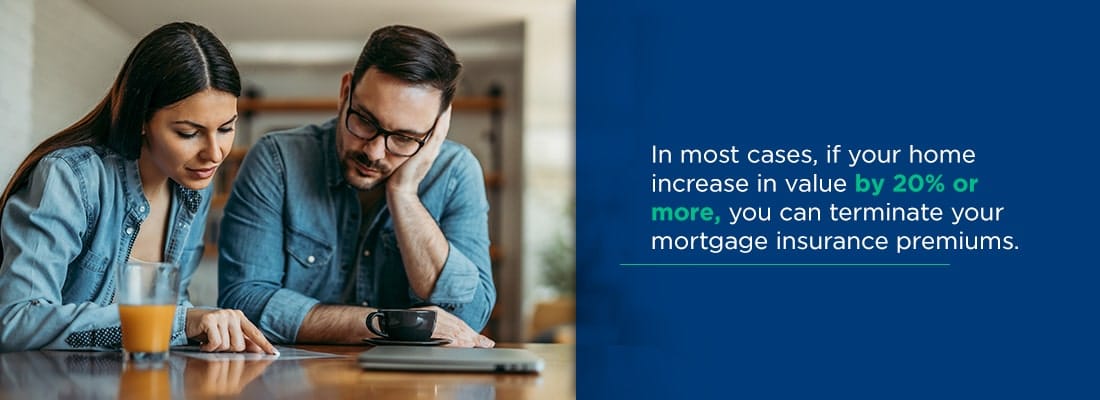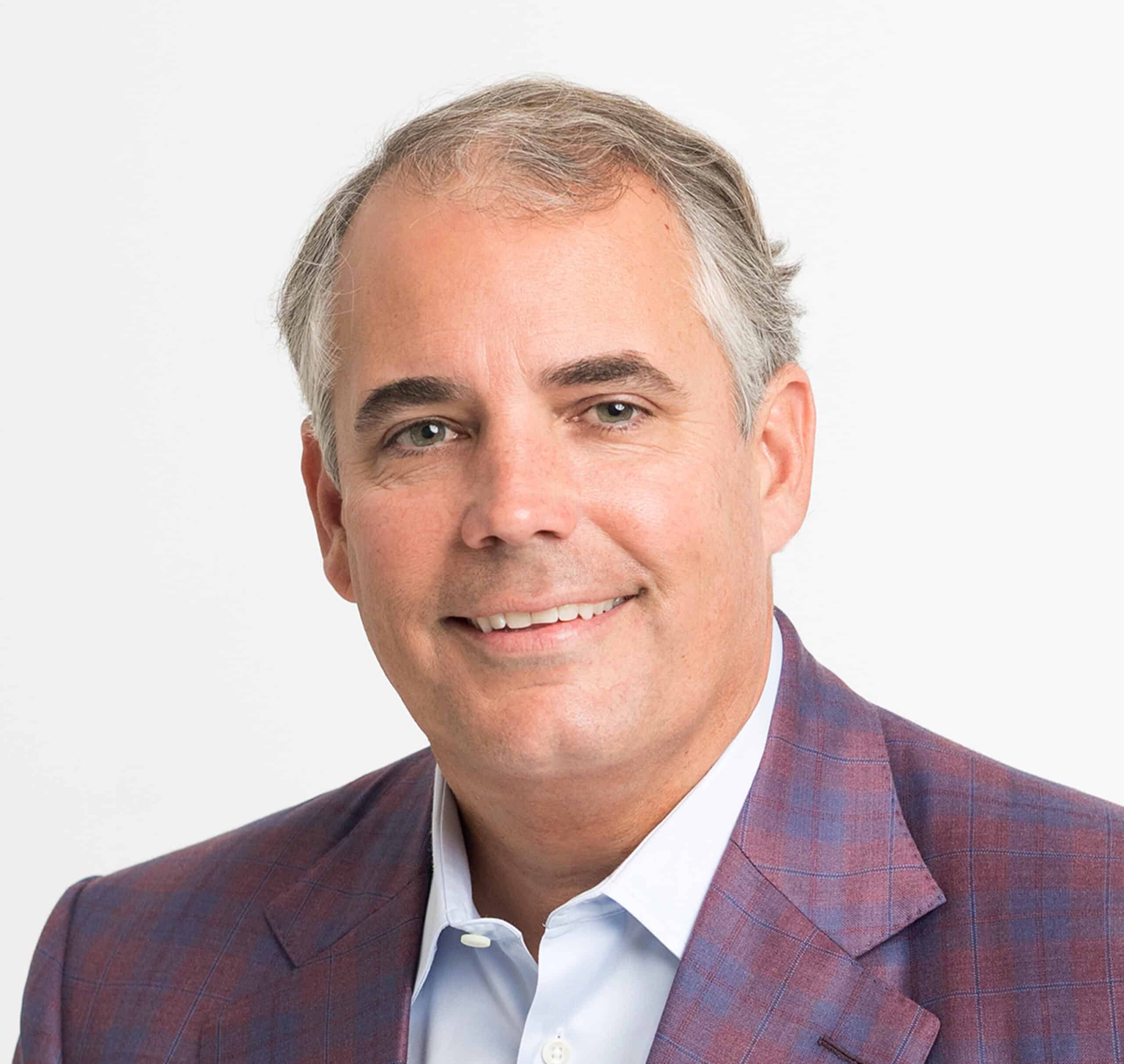Purchasing a new home is an exciting step in life and requires a lot of time, research and planning. Before signing the final papers, there are many factors to consider and scenarios to prepare for to secure your home financing solution. In today’s market, you will likely have to take out at least one type of loan to help you pay for the house in a manageable way.
In some cases, you may have to take out several loans or pay for something called private mortgage insurance (PMI). Read on to learn more about how private mortgage insurance can allow you to purchase a home, even if you don’t have enough resources to make a standard down payment.
Table of Contents
- What is PMI?
- What is Mortgage Insurance on a Home Loan?
- Is PMI Good or Bad?
- Types of Private Mortgage Insurance
- Ways to Avoid Paying Mortgage Insurance
- How Much is PMI per Month?
- Does PMI Decrease Over Time?
- Does PMI Go Away if Home Value Increases?
- Find a Loan Officer
What Is PMI?
PMI stands for private mortgage insurance (PMI), which is a type of insurance for mortgages if you have a conventional loan. PMI is an additional payment on top of your standard monthly mortgage. The fee varies by situation and property value and gives your lender added security. The PMI payment protects your lender with a safety net of funds in the event of mortgage default and foreclosure.
In short, PMI lowers the risk for lenders who give money to people who lack the funds necessary to make a standard down payment on a house. While PMI protects the lender, it can add a costly monthly fee to your house payments. Luckily, there are ways to expedite the payment process and pay off enough of your home to eliminate the need for PMI.
What Is Mortgage Insurance on a Home Loan?
Whether you’re buying a home for the first time, refinancing or looking to purchase a house in the future, you may be wondering whether you’ll need to use private mortgage insurance. With PMI, you can still have your home loans approved even with less than a 20% down payment.
In general, lenders require mortgage insurance on a home loan if the borrowers provide less than a 20% down payment. Usually, the less money you can submit as a down payment, the higher your PMI monthly payment will be. To determine if you’ll need PMI on your home purchase, you first need to understand what PMI is and how it works.
Why Lenders Require PMI on a Home Loan
If you’re looking to buy a home, you should typically plan to save at least 20% of the purchase price for a down payment. If you do not have the standard 20% prepared, your lender will likely require you to pay private mortgage insurance premiums. To understand why lenders require PMI in these situations, consider what happens when someone defaults on their mortgage.
A mortgage default occurs when the homeowner misses at least three consecutive monthly payments, generating a loss of income for the lender. However, many states have laws that delay eviction, and the lender may have to wait two or more years before reclaiming a home.
By the time the house is sold in foreclosure, the lender could have accrued losses from months of missed payments plus years of potential property damage or neglect. The average loss a lender takes during the foreclosure process is about 20%, which is why the standard down payment is 20%. PMI payments help cover the lender’s losses in the event of default and foreclosure.
How Is Credit Score Related to PMI on a Home Loan?
A credit score gives lenders a numerical score for how creditworthy you are — essentially, this is a determination of the likelihood you’ll repay your loans on time. The higher your credit score, the more creditworthy you appear to banks and lenders. Higher scores may come with benefits, such as lower interest rates and higher loan approval rates.
Your credit score can make a significant impact on what you pay in monthly mortgage insurance premiums. PMI premiums are adjusted based on the creditworthiness of the borrower. A good credit score indicates a high level of creditworthiness and can reduce your monthly payments.
The difference in premiums can vary greatly depending on your credit score. You could save thousands of dollars in mortgage insurance payments throughout your loan with a high credit score.
Is PMI Good or Bad?
Mortgage insurance can improve your ability to purchase a home even if you don’t have the funding that’s traditionally required. In short, PMI makes low down payments possible.
In this way, PMI can benefit many homebuyers. With PMI, mortgage lenders make low and zero down payment home loans more accessible, making homeownership possible for buyers from various backgrounds. Borrowers with mortgage insurance also have the possibility of canceling PMI payments after acquiring enough equity through regular, timely payments.
While no one likes the idea of making payments on top of their regular mortgage, PMI can be an asset to homebuyers who want to purchase a house without a standard down payment. Since mortgage insurance doesn’t require a full 20% down payment upfront, PMI can get you in the home of your dreams sooner.
Everyone’s situation is different, and mortgage insurance provides an alternative so you can buy a house right away without saving the traditional 20%.
Types of Private Mortgage Insurance
As the borrower, you can choose between several options for how you want to make PMI payments. The two most primary categories are borrower-paid and lender-paid mortgage insurance. There are also several less common payment methods, including single-premium and split-premium mortgage insurance.
Understanding the differences between each payment option can help you make an informed decision and select the best type for your specific situation.
Borrower-Paid Mortgage Insurance
This is the most common PMI payment method. Borrower-paid PMI is paid monthly as part of your standard mortgage payments.
With this payment method, you generally make payments until you’ve reached a substantial equity level of your home. Generally, once you’ve reached about 20% of your home’s value, you can request your lender stop PMI payments. It can take years to get to the point where you’re able to cancel your borrower-paid mortgage insurance.
Lender-Paid Mortgage Insurance
Lender-paid PMI is another common payment method. It differs from the previous mortgage insurance because, as the name implies, the lender makes the payments instead of you. To compensate, you’ll pay a higher interest rate on your mortgage.
You typically won’t see the added expense on your mortgage payment, but you will pay more than you would without mortgage insurance.
Lender-paid mortgage insurance is more permanent than borrower-paid. You can’t cancel a lender-paid policy even when your equity is worth more than 20% of the purchase price. The best way to eliminate the extra costs associated with lender-paid mortgage insurance is to refinance your mortgage.
Even with refinancing, there is no guarantee you will find a better deal.
Single-Premium Mortgage Insurance
A single-premium PMI, also called single-payment, requires just one payment upfront. While less common than the previous payment types, this method allows you to get a lower monthly payment while still letting you qualify for a mortgage without a full 20% down payment.
Single-payment mortgage insurance is a nonrefundable payment that you generally pay at closing. However, if you choose to sell your home or refinance in the future, you won’t get your single-premium payment back.
This payment is less common than others because if you don’t have the funding to make a 20% down payment, you might not have enough to pay the insurance premium upfront. You can choose to finance the payment into the mortgage, in which case you’ll pay interest on it until you pay off your loan.
Split-Premium Mortgage Insurance
This final method is very similar to single-premium mortgage insurance. Instead of paying for everything upfront, you split your lump sum into two, paying part at closing and dividing the rest into monthly payments. The upfront portion is typically between 0.5% and 1.25% of the total loan.
The primary benefit of this payment method is you don’t need as much money upfront during closing as you do with single-payment mortgage insurance. You also avoid increasing your monthly payments in comparison to a more traditional buyer-paid mortgage insurance.
The premium paid at closing is nonrefundable. However, you may be able to request that your lender cancel monthly premiums after you’ve reached a substantial level of equity.
[download_section]
Ways to Avoid Paying Mortgage Insurance
If the idea of tacking on an extra fee to your monthly mortgage doesn’t appeal to you, you’re not alone. Luckily, there are several ways to avoid paying private mortgage insurance premiums. Take a look at the following options to determine if one of these alternatives could work for your situation.
1. Secure a 20% Down Payment in Advance
The simplest way to avoid private mortgage insurance is to save up well in advance to make the entire down payment of at least 20% of the purchase price. A larger down payment can also help you get a lower interest rate on your mortgage and reduce the number of fees you’ll pay.
These factors allow you to gain home equity faster, reducing the amount you’ll have to pay back over time.
2. Consider a Piggyback Loan
A piggyback loan allows you to purchase a house with two loans that usually cover 90% of the purchase price. This type of loan helps ease the upfront costs of buying a home without locking you into private mortgage insurance.
You still take out a standard mortgage for 80% of the purchase price with a standard piggyback loan. Then, you take out another, smaller loan that’s typically about 10%, allowing you to pay only 10% upfront as a down payment instead of the standard 20%. This type of loan is also called an 80-10-10.
Another common way to split the mortgage is in a 75-15-10 ratio, in which you’d take out a mortgage for 75% and a loan for 15% and still pay 10% at closing.
Piggyback loans can offer an effective alternative to PMI when you don’t have 20% of your purchase price for a down payment.
3. Find a Loan That Won’t Require PMI
Depending on your circumstances and with a little extra digging, you may be able to find a lender that doesn’t require mortgage insurance. If you’re a veteran, you could qualify for a home loan supported by Veterans Affairs (VA). These loans do not require PMI and eliminate the need for a down payment.
The United States Department of Agriculture (USDA) offers similar home loan programs without mortgage insurance requirements. Your location or situation may qualify you for a USDA home loan.
Other lenders provide specialty loan programs that don’t require PMI, including additional compensating factors to cover a smaller down payment.
4. End Your PMI Early
If you find that paying PMI is unavoidable or the best option in your situation, you can still minimize its financial impact on you by canceling it as quickly as possible. If you have borrower-paid or split-premium PMI, you should monitor your loan balance and payments and request your lender cancels your PMI payments immediately after your equity is at or above 20% of your home’s original value.
Consider making extra payments when you can toward your principal so you can cancel your PMI even faster. Ensure you make your payments on time to increase the likelihood your lender will cancel your mortgage insurance when the time comes.
How Much Is PMI per Month?
Private mortgage insurance payments can vary significantly depending on your unique circumstances. In general, you should expect to pay between 0.5% and 1.5% of the total loan amount each year. For example, on a $300,000 loan, you may pay anywhere from $1,500 to $4,500 every year. This works out to $125-$375 per month.
These rates will typically remain the same throughout your mortgage insurance payments. However, numerous factors can raise or reduce the total percentage you’ll pay annually in mortgage insurance premiums.
The following factors can influence your yearly required mortgage insurance payments, affecting how much you’ll pay per month for PMI:
- Your mortgage loan size: One of the most significant determining factors in your mortgage insurance’s cost is the total loan amount. The larger your loan is, the greater your monthly mortgage premiums will be. For this reason, it’s important to stay within a reasonable budget based on your income and funding.
- The down payment size: Since one of the greatest factors in determining your monthly PMI payments is the size of your mortgage loan, one of the simplest ways to reduce your premium is to increase the size of your down payment. Even if your funding does not support putting the full 20% down at closing, you can pay as much as possible upfront to avoid costly PMI payments.
- Your credit score: Another crucial contributing factor to your monthly PMI premium is your credit score. This component is essential to remember since you can have a great credit score even if you don’t have a lot of cash. Building strong credit habits over time can help you save thousands of dollars in the long run on mortgage insurance.
- The type of mortgage you have: Different types of loans can influence your PMI rate. For example, on a conventional mortgage issued by a bank, you may have a higher PMI than you would on a Federal Housing Administration (FHA) loan. This is because FHA loans are designed to accommodate first-time homebuyers and people with low-to-moderate income levels.
- Property appreciation potential: If you are moving to an area where home values are appreciating, you may receive a lower PMI premium. If your home’s value increases enough, you could even stop PMI payments completely. You can have your home appraised again, and if the value has risen over 20%, you could request the cancellation of your PMI.
Does PMI Decrease Over Time?
Your mortgage insurance rate will usually remain consistent throughout your payments. However, if you’re eager to save money on monthly payments and cancel your PMI early, there are several ways you can get rid of your mortgage insurance premiums.
The following methods are ways you can ditch your PMI and get greater financial freedom:
- Take advantage of final termination: Your lender is usually required to end PMI automatically after you’ve reached the halfway point of your loan’s amortization schedule, regardless of how much equity you’ve acquired. This means if you have a 40-year loan, your lender will terminate your mortgage insurance after 20 years as long as you’re current on your payments.
- Reach equity of 80% or higher: When your equity reaches 20% or more of the original property value, you have the right to request that your lender cancel your mortgage insurance. If you have extra funding, making additional payments is one way to free yourself of PMI faster. As long as you’re up-to-date on payments, the lender should cancel your PMI after you own 20% in equity.
- Refinance your mortgage: If you notice a drop in mortgage rates, you may want to consider refinancing your mortgage to reduce your monthly payments and save money on interest costs. This process could let you eliminate your PMI if your new mortgage is less than 80% of your home’s value. Before committing to refinancing, be sure to consider added closing costs to ensure the transaction is worthwhile.
- Have your home reappraised: The market can make sudden changes to your home’s value. If your property appreciates enough, you could eliminate your PMI with the increased value. If you think this is possible, have your home reappraised. If the value increases by more than 20%, you may be able to cancel your PMI.
Does PMI Go Away if Home Value Increases?
Your property’s fluctuating value can affect your private mortgage insurance. While your PMI won’t magically “go away” if your home value appreciates, you may be able to request that it be canceled if it reaches a certain threshold.
In most cases, if your home increases in value by 20% or more, you can terminate your mortgage insurance premiums. As long as you’ve owned the property for a minimum of five years and your mortgage is no more than 80% of the new appraisal value, you can ask to cancel your mortgage insurance
To start this process, you have to schedule a new appraisal of your home. Keep in mind that most appraisals cost between $312 and $407, with an average of $349. Some lenders may accept a broker price opinion, which can be a cost-effective alternative.
You can help increase the value of your property faster by renovating it or adding new amenities such as an extra room or a swimming pool.
Learn How Assurance Financial Can Help You With Home Financing Today
Assurance Financial offers resources and professional experience which can help make your home purchase easy. We are an independent, full-service residential mortgage banker with more than 20 years of experience servicing the public. At Assurance Financial, we can complete the entire mortgage process in-house with a simple, fully online application.
We are committed to providing quality, personalized service and operating with integrity and honesty. We offer every type of loan on the market and want to do everything we can to ensure you get the service you need.
With Assurance Financial’s support, you can pre-qualify for a loan in as little as 15 minutes. Apply online with Abby, our helpful virtual assistant, or find a loan officer near you to learn more.
Enjoy excellent service and custom competitive rates when you choose Assurance Financial. Contact us online today for a no-obligation quote.
Linked Sources:
- https://www.canr.msu.edu/news/5_facts_to_know_about_mortgage_insurance
- https://www.hgexperts.com/expert-witness-articles/broker-price-opinion-and-property-inspections-practices-and-procedure-for-the-mortgage-industry-18102
- https://www.forbes.com/advisor/mortgages/what-is-a-piggyback-loan/
- https://www.benefits.va.gov/homeloans/
- https://themortgagereports.com/24154/private-mortgage-insurance-pmi-cost-low-downpayment-return-on-investment
- https://eligibility.sc.egov.usda.gov/eligibility/welcomeAction.do
- https://wsecu.org/resources/what-is-private-mortgage-insurance
- https://www.scefcu.org/news-and-alerts/article/average-cost-home-appraisal
- https://assurancemortgage.com/apply/
- https://assurancemortgage.com/find-a-loan-officer/
- https://assurancemortgage.com/contact-us/
Additional Sources:
- https://themortgagereports.com/17948/private-mortgage-insurance-pmi-conventional-loans
- https://www.nerdwallet.com/article/mortgages/pmi-calculator
- https://myperfectmortgage.com/how-your-credit-score-affects-the-pmi-premium/
- https://www.bankrate.com/mortgages/removing-private-mortgage-insurance/
- https://www.investopedia.com/ask/answers/081214/average-what-can-i-expect-my-private-mortgage-insurance-pmi-rate-be.asp


